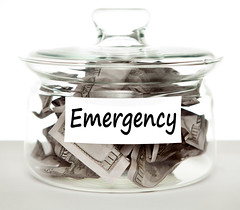According to a recent survey conducted by Bankrate.com, 28% of Americans have no emergency fund, up from 24% a year ago. About 49% of people surveyed said they had no emergency savings or less than three months’ expenses.
The traditional prescription for life's financial emergencies is to hold three to six months' worth of living expenses in cash. Only 25% of those surveyed said they had enough to cover six months’ or more of expenses. In a low-yielding environment, many are concerned that keeping aside six months’ of emergency savings is a lot of money to have sitting in the bank earning next to nothing. While this is a valid concern, customizing your emergency fund to fit your personal situation may serve as a viable solution.
Consider holding a larger emergency fund (six months to a year) if you have a high paying job, are self-employed, work on a freelance/contract basis, have dependents, have a nonworking spouse, have high fixed expenses (mortgage, auto loan, tuition bills), or have a pre-existing medical condition that could result in hefty health-care bills if you were forced to purchase private health insurance. On the flip side, you may be able to get by with a smaller emergency fund if you:
1. Have a good degree of career flexibility because you are in a lower-paying position and/or haven't yet developed a specialized career path.
2. Have other sources of income that could help defray a large share of household expenses, such as a working spouse.
3. Have a great degree of lifestyle flexibility (for example, you would be willing to relocate).
Source: Bankrate.com Financial Security Index survey, June 25, 2012.

 248.335.7211
248.335.7211